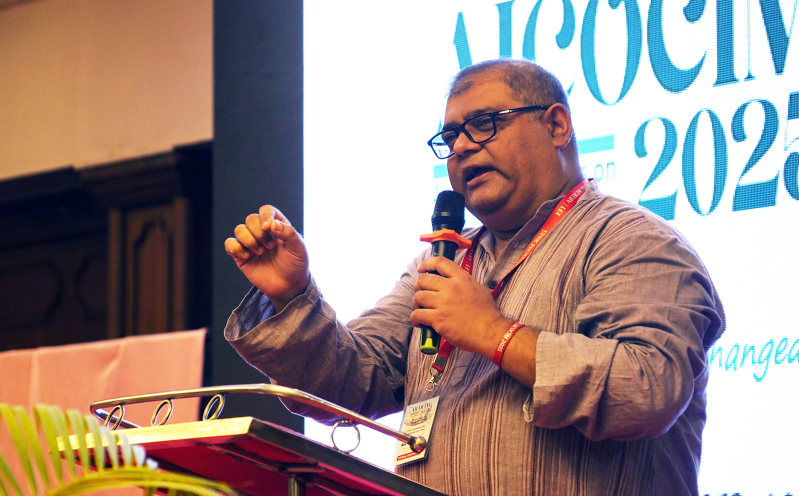
The opening keynote of the All India Congress on Church in Mission (AICOCIM) became a wide-ranging call to action Monday afternoon (Sept. 15) as Evangelical Fellowship of India (EFI) General Secretary Vijayesh Lal urged nearly 450 Christian leaders to embrace surrender, courage, and Spirit-guided imagination to meet the challenges of this moment in history.
Addressing a packed hall, Lal described the four-day Congress as more than a gathering of leaders but a “kairos moment” — a time when God’s people are summoned to repentance, clarity, and fresh obedience.
“This is no ordinary gathering and we have not convened out of habit,” Lal said. “We meet because this is a kairos moment — a time when the ordinary passing of days is charged with urgency, when God calls his people to attention, repentance, and courage.”
The Congress, convened by EFI, marks the first AICOCIM in 15 years. It brings together denominational leaders, theologians, educators, and ministry practitioners from across India to discuss pressing issues, share insights, and establish task forces that will carry the work forward well beyond the event.
The greatest challenge is not outside but within the Church
Lal began his address by reframing the current moment not as one of despair but of opportunity — provided the Church faces the real issues at hand. He said the greatest danger confronting the Indian Church today does not come from the outside, rather it is its internal weakness.
“There is a gap, and it is widening — between the gospel we proclaim and the disciples we produce, between the doctrines we affirm and the lives we lead,” Lal said. “A Church that is broad but shallow cannot stand when the winds rise. Only disciples will endure.”
Lal warned against the temptation to rely on numbers, programs, or social acceptance as a measure of health. “The crisis of the Indian Church today is not primarily about external pressures,” he said. “It is a crisis of formation, of imagination, and of obedience.”
A large section of Lal’s address focused on the need for intentional, sustained spiritual formation. He urged leaders to return to the basics of Christian discipleship — cultivating communities where believers are grounded in Scripture, shaped by prayer, and accountable to one another.
“Formation begins in families where children are taught to pray and to love truth,” he said. “It continues in congregations where Scripture is opened regularly, the Lord’s Table is honored, and prayer is central. And it deepens in small communities where believers confess sin, carry each other’s burdens, and practice forgiveness.”
Such formation, he noted, is not quick or glamorous work but is essential if the Church is to endure. “Crowds may gather for a season,” Lal said, “but only disciples will stand in the storm. Consumers may enjoy religion when it is convenient, but only cross-bearers will carry the gospel when it is costly.”
He challenged the Church to confront cultural idols that hollow out faith, including the pursuit of wealth, reputation, and power. “When faith is reduced to a commodity, it will collapse under pressure,” he said. “Formation must produce believers who can bear the disgrace of Christ outside the camp.”
Unity as necessity for witnessing to a watching world
Another central theme in Lal’s keynote was unity — not merely as an aspiration but as a practical necessity for the church’s survival and credibility. He lamented that denominational rivalry, caste prejudice, and regionalism have weakened the Church’s witness.
“We have allowed denominational rivalry to undermine mission. We have allowed caste prejudice to fracture fellowship. We have allowed regionalism to breed mistrust as though the Church of Christ in one state were in competition with the Church in another,” Lal said. “Yet the gospel leaves us no excuse for such divisions.”
Unity, he emphasized, is not the same as uniformity. “The Church in India does not need to sing one song or follow one structure,” Lal said. “But it does need to recognize that we belong to one Lord, one mission, and one destiny. To stand together across caste and class, across language and tradition, so that the watching world may see not our preferences but His glory.”
He described AICOCIM as a rare opportunity for leaders to model this kind of unity: “It can be a place where humility disarms pride, where repentance heals mistrust, and where the call of Christ rises above the voice of competition.”
Mission as a holistic and integrated witness rather than isolated programs
Lal also pressed for a vision of mission that is broad and integrated, not reduced to a single task or short-term program. He cautioned that if participants treat the thirteen strategic tracks at AICOCIM — covering mission, education, women’s leadership, discipleship, justice, and more — as isolated menu items, they will fail to achieve lasting impact.
“These tracks are not designed to give us temporary conversations but to shape long-term commitments,” he said. “If we treat them as separate components, we will miss their purpose. But if we walk them as pathways that carry us together, we will go further together than we could ever go apart.”
He emphasized that mission must be both proclamation and demonstration — preaching the gospel, forming disciples, caring for the vulnerable, and addressing injustice in society. “The apostles did not do these sequentially, but simultaneously,” Lal said. “Their witness was not fragmented. It was whole, and so must ours be.”
Building resilience through stewardship, entrepreneurship, and servant leadership
In an extended section, Lal spoke about the need for the Church to develop economic resilience and wise stewardship. “A Church that depends entirely on outside aid will remain fragile,” he said. “A Church that nurtures entrepreneurs, stewards resources wisely, and generates livelihood will not only stand firm but will also be able to serve others with credibility and compassion.”
He said that EFI’s calling is to serve rather than control, describing the fellowship’s role as that of a gardener rather than an architect: planting seeds, clearing ground, and enabling others to flourish. “Our calling is not to dominate but to serve,” he said. “EFI is at its best when it enables others to flourish — when leaders are encouraged, when ministries are strengthened, when churches collaborate.”
Lal reminded participants that leadership in the Church must always follow the pattern of Christ, who took the form of a servant. “Convening this Congress does not mean that EFI claims to set the agenda of the Church,” he said. “Rather, it is our way of holding a space for the Church to discern together what faithfulness requires. EFI leads only by serving — and if we cease to serve, we cease to lead.”
He cautioned leaders against equating success with visibility or prominence. “If our greatest achievements are only visible on our own letterhead, then we will have failed,” he said. “If they can be seen in the health, maturity, and resilience of the Church in India, then we will have succeeded.”
Surrender, courage, and imagination
In closing, Lal presented what he called a threefold posture that he believes the church must embrace to be faithful in this generation: surrender, courage, and imagination.
Surrender, he said, is the act of entrusting the future of the church to Christ’s care. “Our task is not to secure our own place but to yield to His reign, to lay down pride, competition, and fear, and to place the future of the Church in His hands,” Lal said.
Courage, he continued, is not loud defiance but steady obedience. “To stand with Christ means refusing false comforts, proclaiming truth when it is unpopular, and living with integrity when it is inconvenient,” he said.
Finally, imagination is the Spirit-given capacity to see new possibilities for mission in a changing world. Lal called for creativity that remains rooted in Scripture and guided by the Spirit.
“The future of the Church in India will not be secured by repeating old patterns,” he said. “We need the imagination of the Spirit to equip the young for whole-life discipleship, to engage cities shaped by migration and technology, to confront injustice with holy love, and to build communities where faith is resilient and hope is contagious.”
Throughout the keynote, Lal emphasized that AICOCIM must not end when the delegates return home but must continue as a movement shaping the Church’s witness for years to come.
“AICOCIM is not the destination. It is a signpost,” he said. “It is not the voice; it is a table where voices can be heard. It is not the house; it is seed sown in faith, trusting God for the harvest.”
He urged participants to leave AICOCIM with fresh commitments that would outlast the conference itself. “May this Congress not mark merely the memory of an event, but the beginning of a renewed witness,” he said. “May generations yet unborn look back and say that in these days, the Church chose faithfulness over fear, obedience over ease, and Christ above all.”






